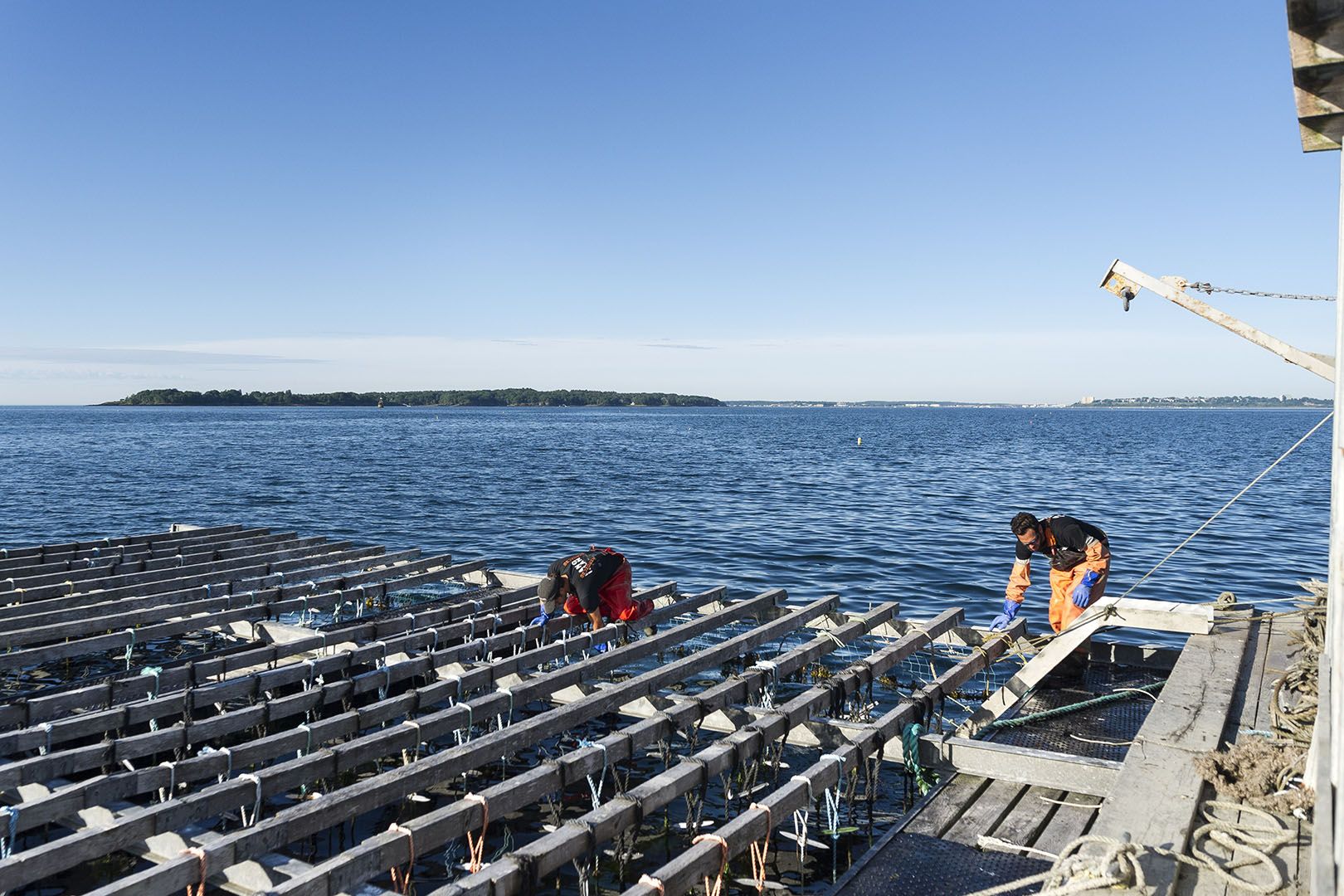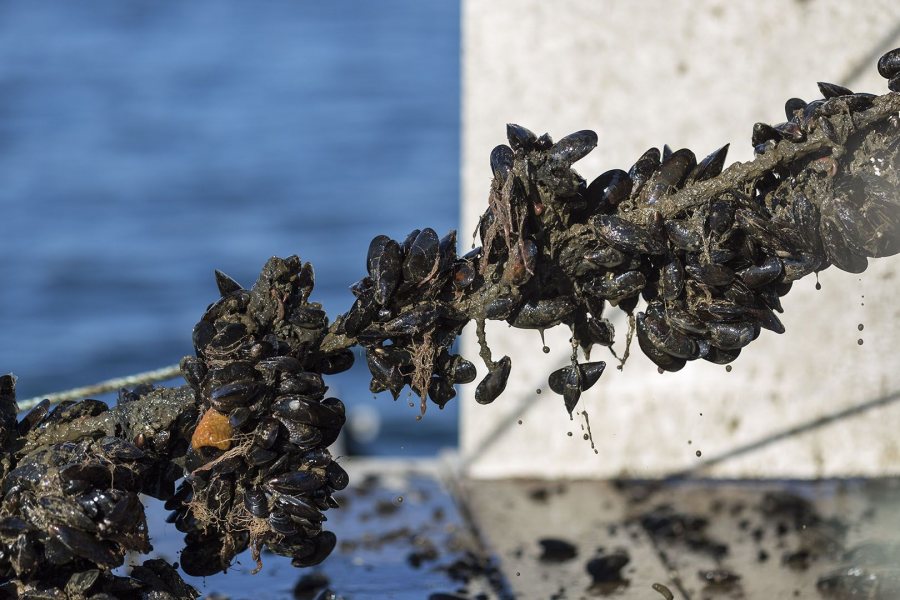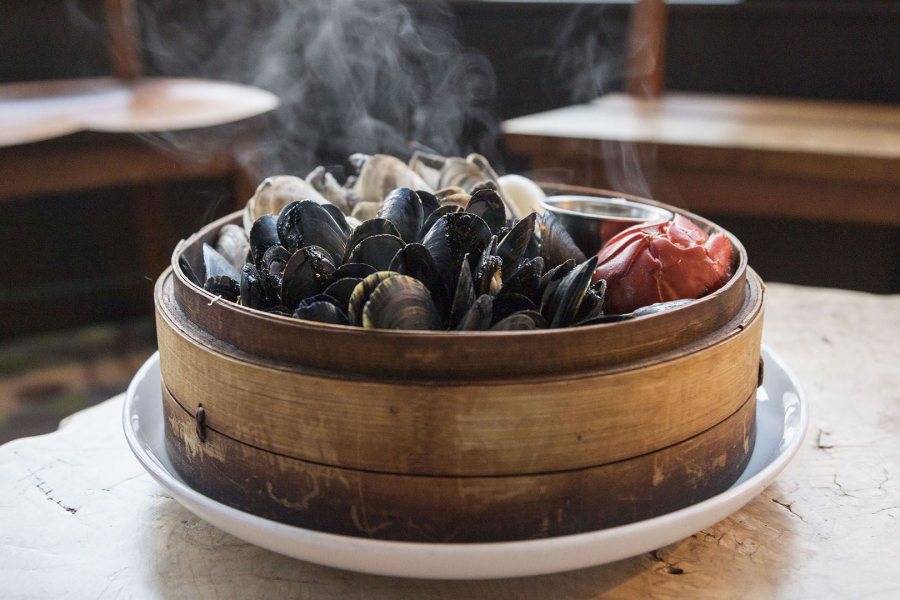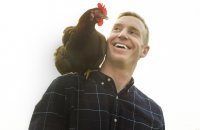
Maine native Matt Moretti ’06 has always loved the ocean.
“From the beginning, I’ve been interested in the sea and the way organisms function, in a biological sense,” he says. “And while I had that interest, it was always a nondescript, undefined kind of love for natural processes. It wasn’t fully formed.”
At Bates, Moretti’s passion began to take shape as he majored in biology and took marine biology courses, amassing knowledge that would eventually support a stint at the New England Aquarium, a Northeastern master’s program in marine biology, and global sojourns to far-flung ecosystems like Mo’orea in the South Pacific, where an encounter with French Polynesian shrimp farmers turned on a lightbulb.
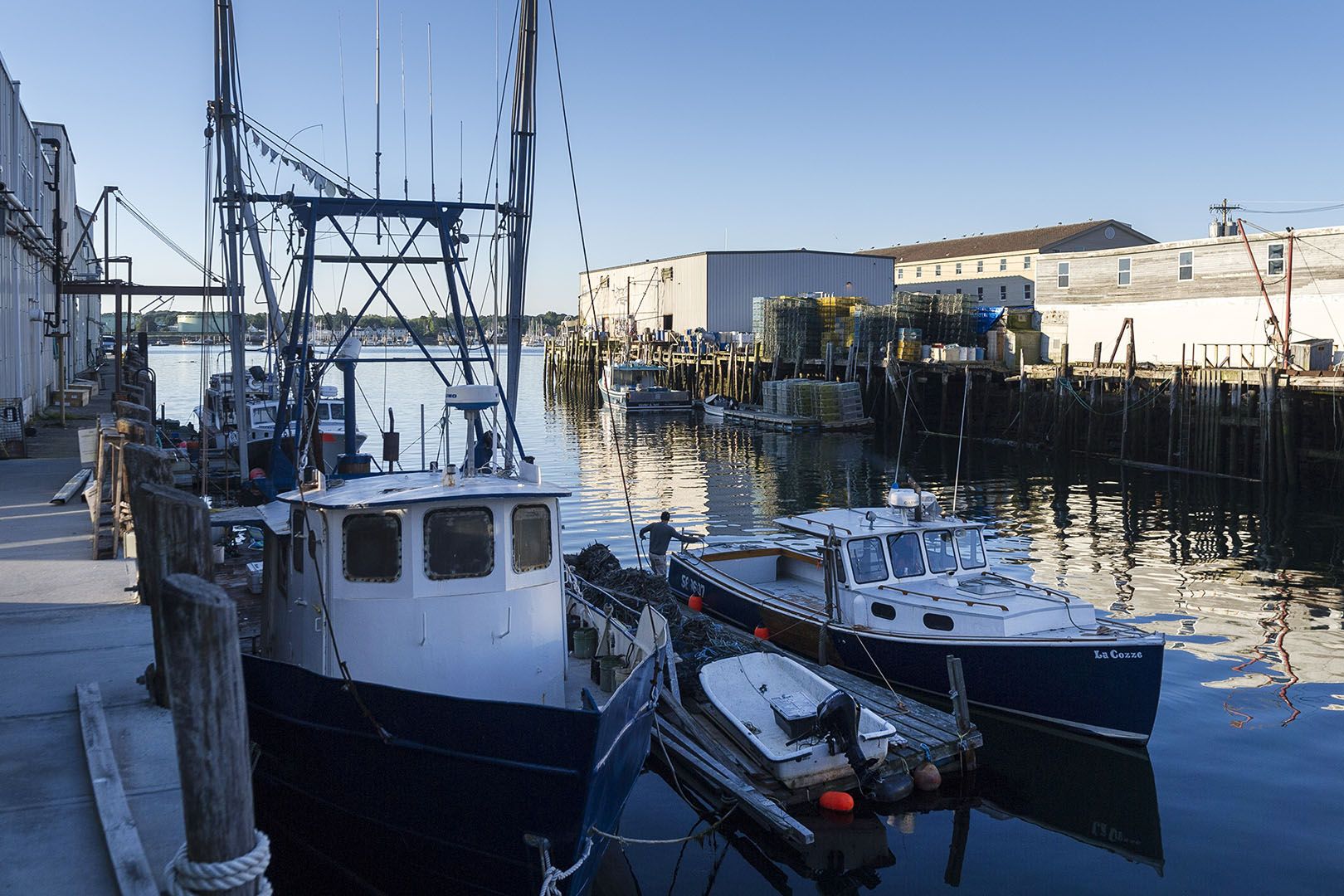
Moretti’s mussels operation on Custom House Wharf in Portland includes, at right, his working boat, La Cozze, and his houseboat, at left.
“I realized the traditional ocean research track wasn’t what I wanted to do [with my life],” he says, so after his time in Mo’orea and Catalina, as part of his master’s work, “aquaculture presented itself as a tangible something I could do, not just be interested in.”
Moretti returned to his home state, eager for experience and work. He found it on an oyster farm, where he cultivated his love for aquaculture.
And then he learned that a Casco Bay mussel farm was for sale.
Son and Pop Shop
In 2010, Moretti and his dad, Gary, bought Bangs Island Mussels.
For some, mixing business and family would be an instant recipe for disaster, but Moretti appreciates his business arrangement.
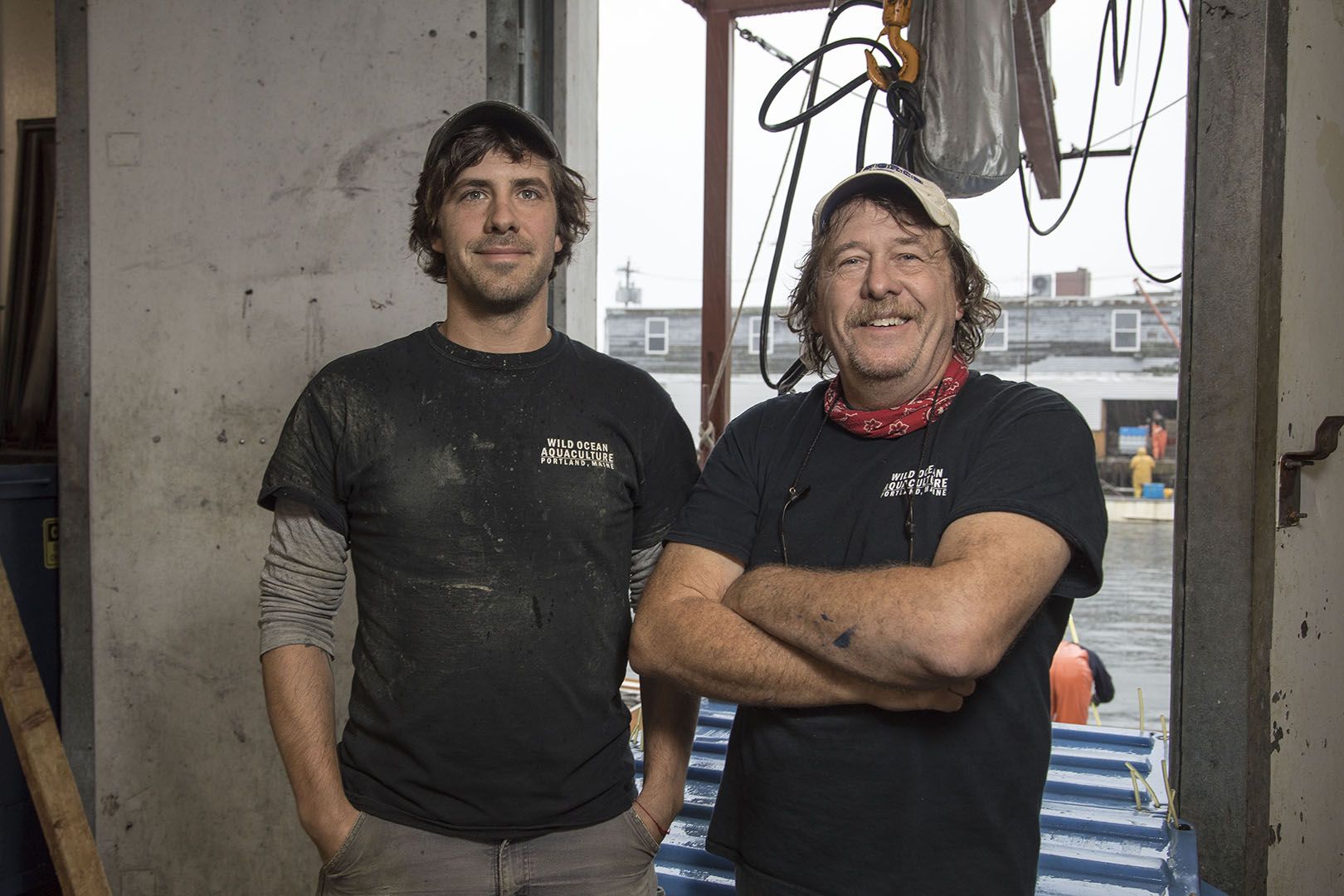
Moretti and his father, Gary Moretti, pose for a portrait at the Bangs Island Mussels processing facility on the Portland waterfront.
“Dad’s given me a lot of freedom to do things in the business that I wouldn’t have had in a more traditional relationship with a business partner. He puts a lot of faith in my ability to help make things happen.”
He pauses.
“We have a lot of trust in one another, I suppose. He always has my back, and I always have his.”
Early Bird
On harvest days, which occur two or three times a week throughout the year, Moretti and his team begin at six o’clock; for five months of the year, that’s before the sun has risen.
They meet at a marina warehouse, the home of Bangs Island Mussels land operations, located on a wharf off Commercial Street in downtown Portland.
The supplies for the day are lowered into an idling boat, La Cozze, Italian for “The Mussel,” by a small crane over the cargo hold. Crates packed with ice, empty “totes” (large plastic bins), and a silvery stainless-steel sorting table are arranged on the deck.
Then, the boat shoves off, carefully minding Loretta, the harbor mascot, a partially-blind seal who makes her home in the calm waters of the marina, before setting course due east.
It will take slightly less than an hour to reach the first raft.
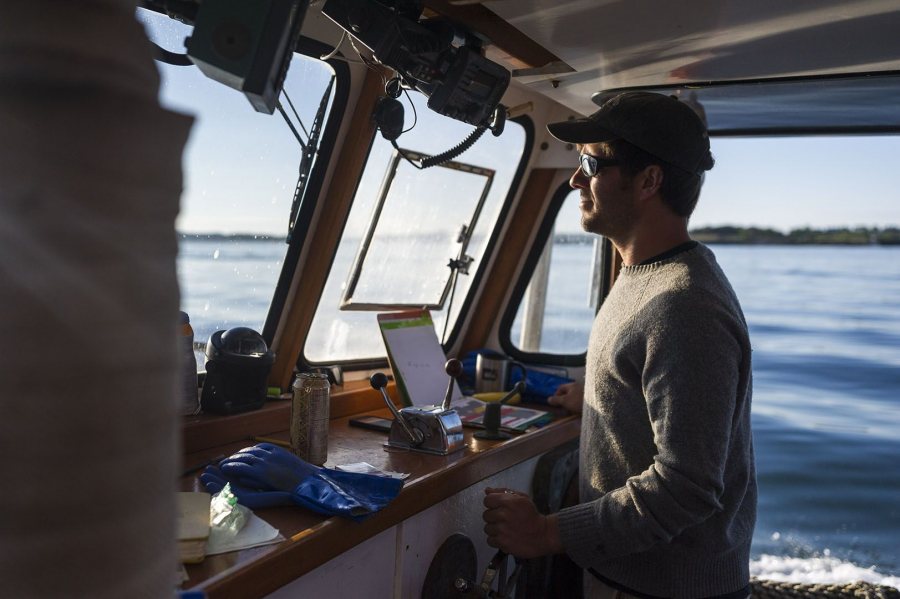
Moretti ’06 steers La Cozze out of Portland Harbor toward Clapboard Island in Casco Bay, the site of the day’s mussel harvest.
Grit-Free Grub
You can cultivate mussels any number of ways. Moretti uses the Spanish style, in which thick, coarse ropes, each seeded with mussels, hang suspended from rafts that float in the cool waters of the Casco Bay.
It takes the mussels about 18 months to mature. All the while, the filter-feeding shellfish feed on the nutrients within their ecosystem, giving Bangs Island Mussels a distinctive flavor profile, says Moretti.
“It’s not dissimilar to wine, where the same type of grape will taste different depending on where it’s grown, the specific region of earth, and its surrounding climate.”
Unlike some of their bivalve brethren, the mussels don’t come into contact with the sandy bay bottom, so they are grit-free, creating a more enjoyable experience for the eventual diner.
Plus, because the rafts are protected with nets, the mussels aren’t in danger of being eaten by crabs or starfish. With the lack of predation, the mussel’s shell remains thinner, allowing the meat to grow thick, sweet, and plump.
Moretti has 10 rafts on his aquatic farm, along with a processing barge, “and we can have 400 lines on one raft alone,” he says.
Phase 1
Once the team reaches the farm, the work continues. First, they use their boat to pull the barge — which houses all of the processing equipment — into position next to one of the rafts.
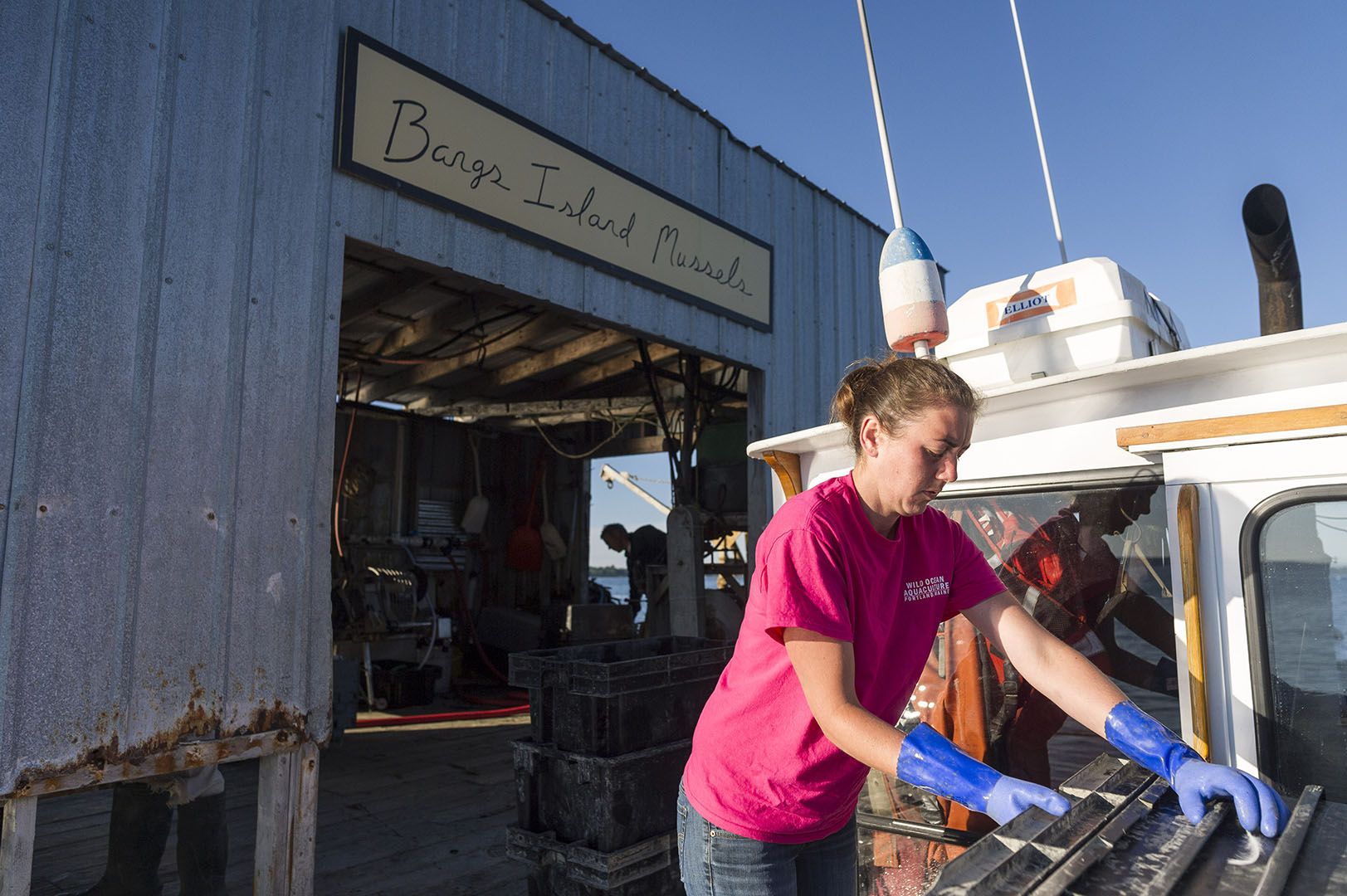
After reaching the harvest site off Clapboard Island in Casco Bay, the crew prepares the barge for harvesting.
Next, the team begins to pull lines, attaching the mussel ropes to a medieval-looking pulley system on the barge that drags the lines through a tiny hole, releasing the mussels from the rope like beads from a broken necklace.
As the mollusks spill onto the deck, they’re moved into a large pile with colorful plastic shovels, the Crayola red and yellow standing in sharp contrast to the mud-soaked planks of the barge. Moretti and his workers spray the mussels, both to wash off mud that collects despite their perch above the ocean floor and to keep them cool and fresh.
The mussels are then spun through the stainless-steel declumper and grading wheel, which help weed out the smaller mussels from the market-grade fare.
The hum of the hydraulic motors running the declumper forbids any conversation below a hearty yell. Instead, the team works with a quiet cadence, using hand signals when necessary.
Once the mussels are carefully hand-sorted, they are placed on ice and loaded onto the boat.
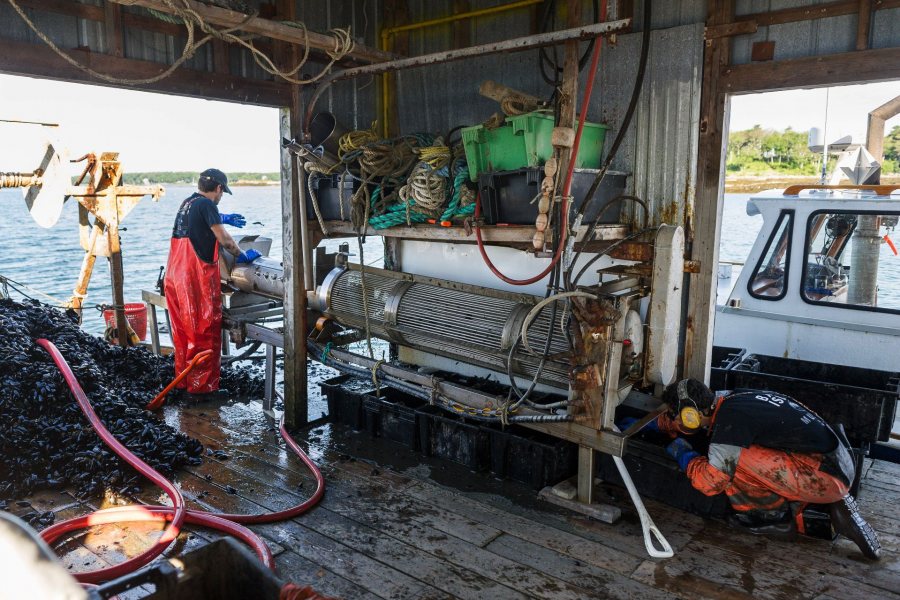
On the barge, Moretti (left) feeds the clumped mussels into a machine that breaks their byssal threads and does an initial sorting. Crew member Adam Shapiro (right) collects the separated mussels.
Duck Tales
“Aquaculture on the ocean, like we do it, basically takes two jobs with very unpredictable elements — farming and fishing — and puts them together,” says Moretti.
“We’re in the open ocean, vulnerable to a lot of elements at play that we don’t have control over. We try and mitigate those risks as much as possible.”
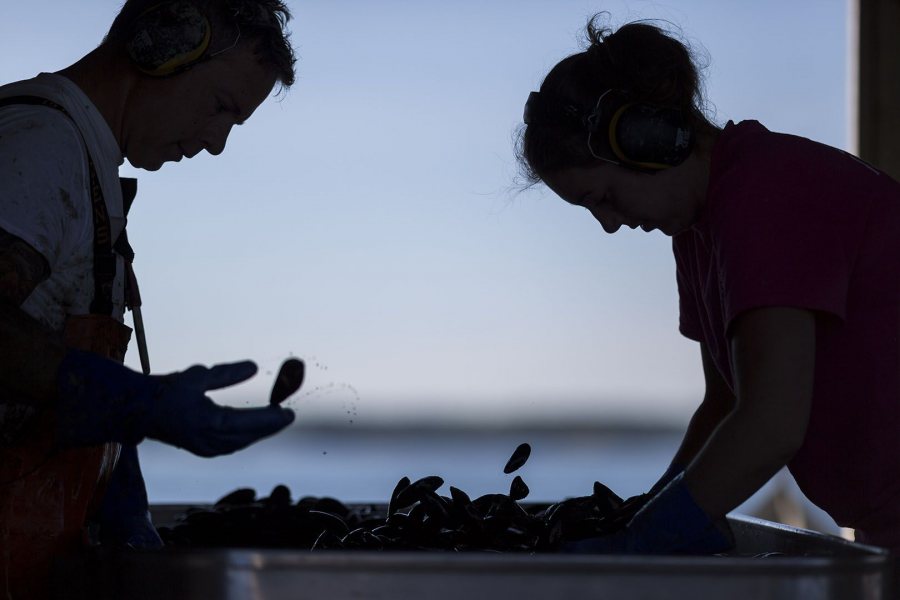
After they’re declumped, cleaned, and sorted by machine, the mussels are hand-sorted by crew members Kirstina Littig and Daniel Dunham.
While heavy winds and torrential storms can spell trouble for raft-style mussel farms, it’s a certain duck-billed deviant that poses the biggest (and perhaps most annoying) threat.
“Eider ducks are the bane of my existence,” says Moretti, chuckling softly. “They’re incredible mussel eaters. They can eat their body weight in mussels in a single day.”
Moretti and his crew spend a large amount of time and energy attempting to passively deter the ducks from eating their mussels by deploying protective netting that hangs below the waterline around the rafts.
Good fences make good neighbors…and tasty mussels grown to term.
Sorting It Out
The harvest is delivered back to the warehouse by 3 p.m., where the second shift waits to begin their day’s work.
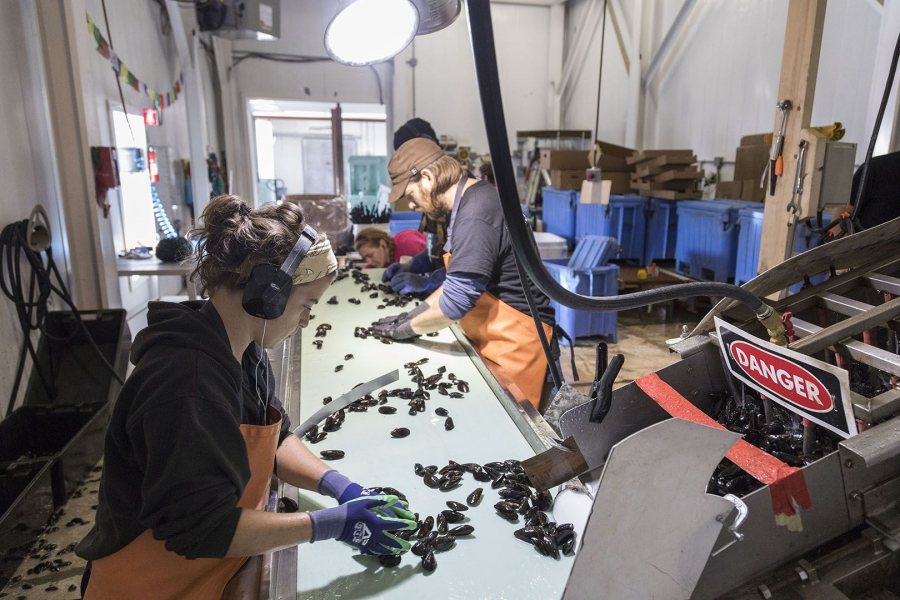
Back at the Bangs Island processing facility on the Portland waterfront, workers process and prepare the harvest for delivery to eateries near and far.
Under the watchful eye of Gary, who manages this second phase of the harvest, the Bangs Island team members continue the “wash, rinse, repeat” mantra executed on the barge.
The mussels are fed through a variety of sorting and debearding machines, and are subject to more inspection and hand-grading before they’re packed on ice, ready for the distributors.
On average, the team can process 2,500 pounds of product in a single day.
Building a Responsible Business
From an environmental perspective, mussel farming is a very low impact way of producing food compared to other farming systems. And Moretti’s proud of that fact.
“We wouldn’t get into a business that had a negative effect on the environment,” says Moretti.
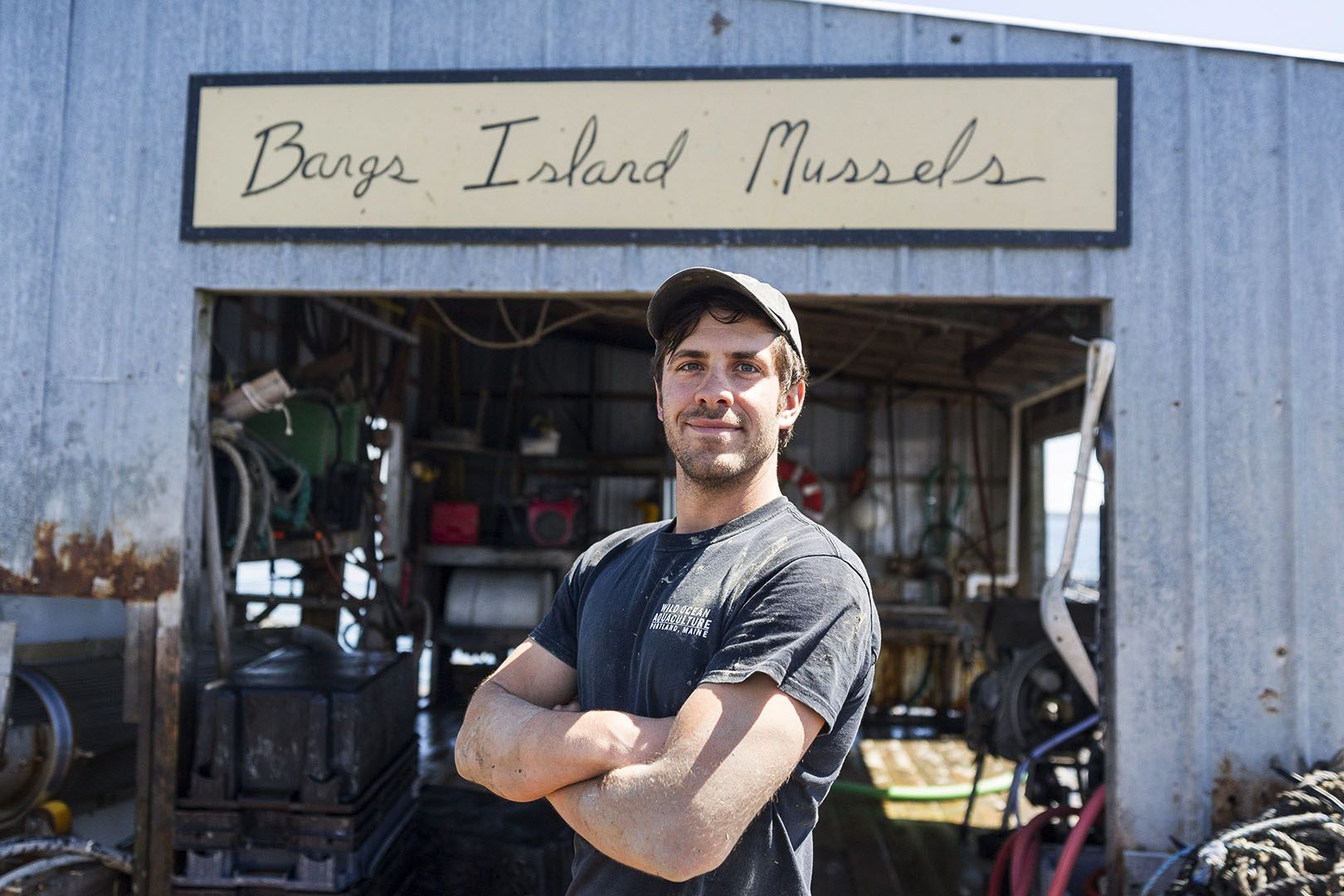
“Our ocean farming practices go back to our core company goals: to provide the finest quality seafood in a completely safe and sustainable manner,” says Moretti.
As active filter feeders, mussels improve local water quality by “removing phytoplankton, which in excess can reduce water quality,” explains Professor of Biology Will Ambrose.
Mussels also remove carbon from the water but whether that helps make seawater less acidic — a claim made by some aquaculture supporters — isn’t proven, Ambrose says, noting that “the carbonate system that controls seawater pH is very complicated.”
Moretti and his father believe strongly in employing environmentally safe farming methods. “We don’t add anything artificial or foreign to the system to help grow the mussels,” says Moretti.
“Our ocean farming practices go back to our core company goals: to provide the finest quality seafood in a completely safe and sustainable manner.”
Spreading the Love
Today, Bangs Island Mussels are distributed nationally, from Atlanta restaurants to Denver eateries and everywhere in between.
Close to home, one of Moretti’s local buyers is self-taught culinary wizard Andrew Taylor ’03, an award-winning chef and co-owner of three Portland restaurants, Eventide Oyster Co., Hugo’s, and The Honey Paw.
At The Honey Paw, Taylor uses Bangs Island mussels in dishes like a Vietnamese masa crepe (fried mussels, shrimp and tomatillo sambal, and maple dipping sauce) and at Eventide in a “New England Clam Bake”: mussels, clams, lobster tail, potatoes, salt pork, and a hard-boiled egg nestled into a bed of rock seaweed.
“Having Matt harvesting mussels less than a mile away and bringing them straight to our restaurant the day they’re out of the water — from a quality perspective, you can’t get better mussels than that,” says Taylor, whose Bates food network also includes Eric Peters ‘86, proprietor of Norumbega Oyster Co. in Damariscotta.
“Then you add the additional benefits of supporting local agriculture, local businesses, keeping it all in everybody’s pockets in Maine. We feel really great about that, too.”
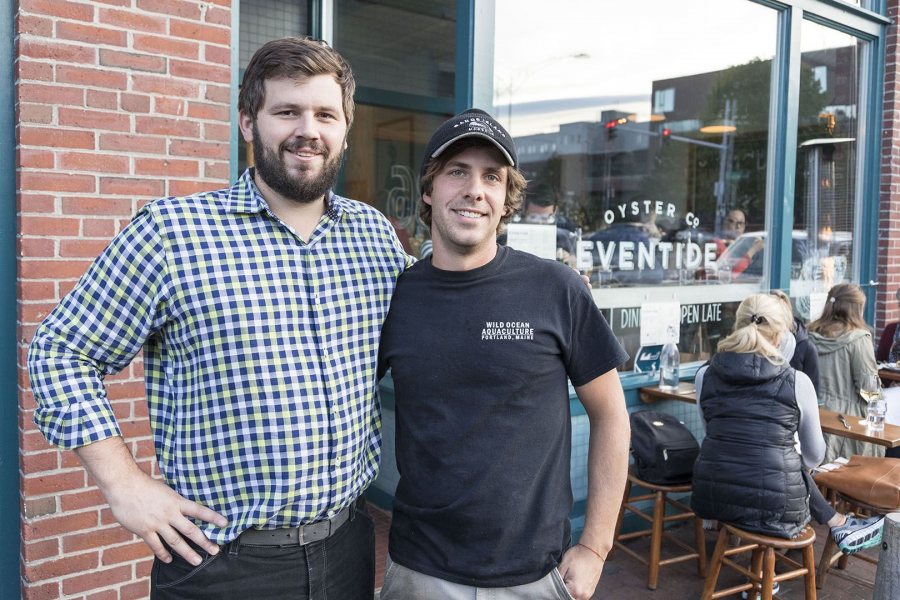
Moretti poses with one of his clients: Andrew Taylor ’03, chef and co-owner of three Portland restaurants, including Eventide Oyster Co.
Eventide has “always supported us with our mussels,” says Moretti, who counts that support to include his new venture into sugar kelp. “They enjoy taking a chance on some local, high-quality seafood, and they’ve been fantastic partners.”
Despite his national reach, Moretti feels a certain level of responsibility and privilege contributing directly to the Portland public.
“We employ people who live here,” says Moretti. “We buy as much as we can locally and enjoy sharing our mussels with the Portland community. I absolutely love that.”
